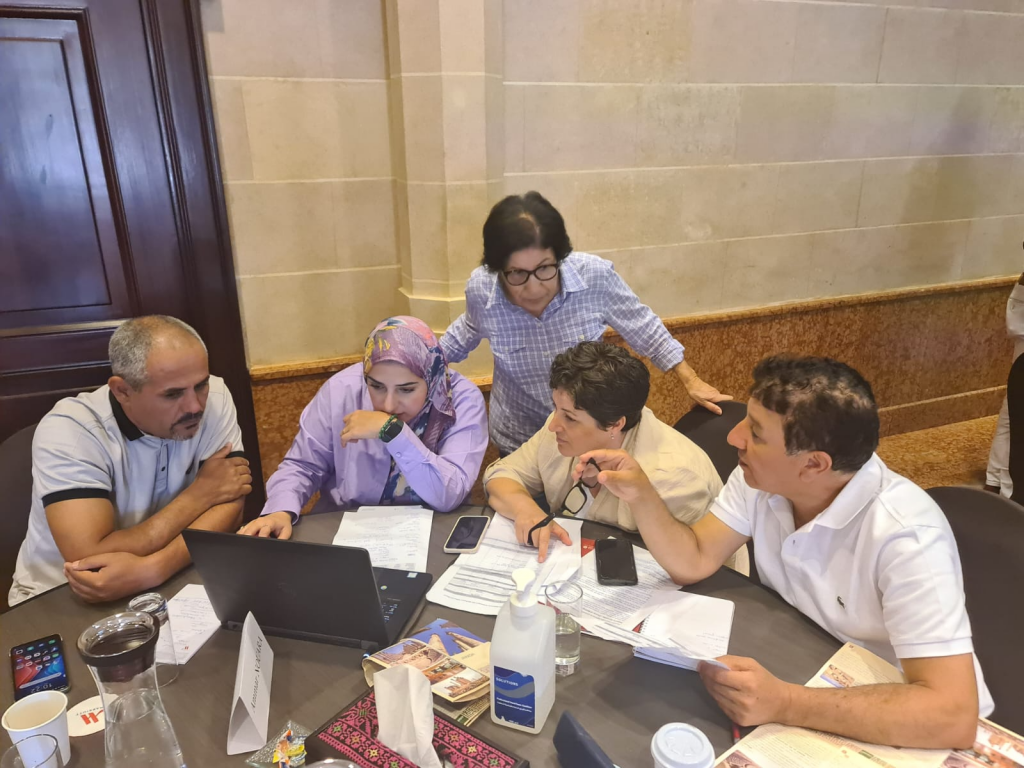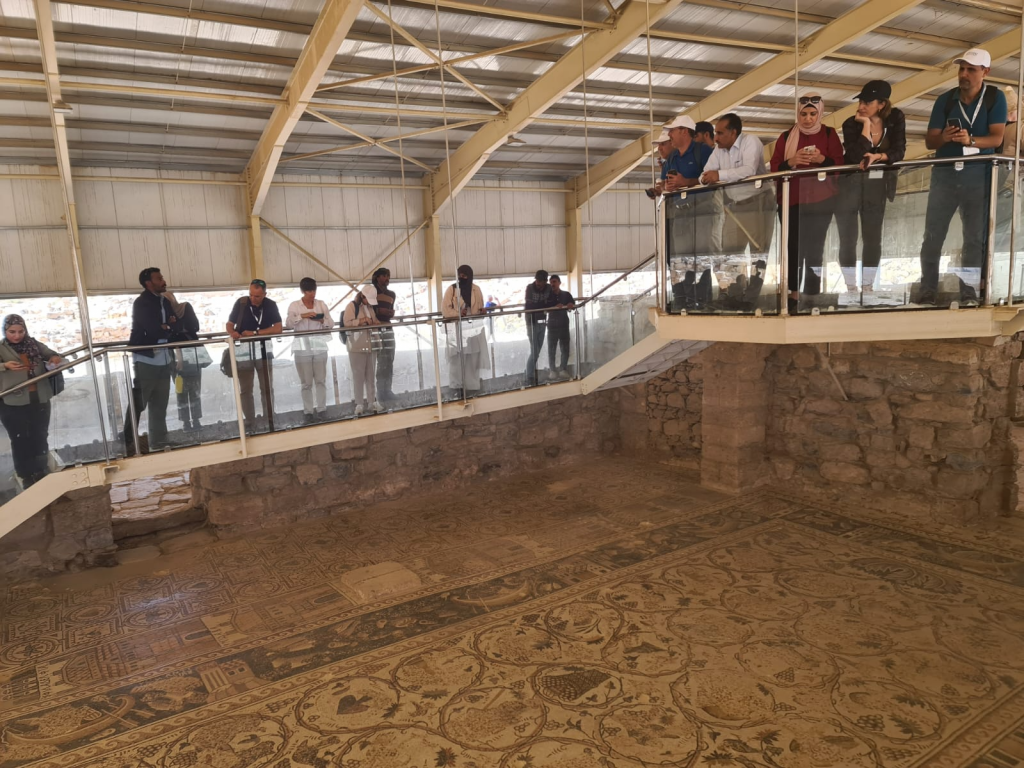Through theoretical sessions and field visits some 20 participants from 10 countries trained over two weeks on preventive conservation for archaeological mosaic sites
Rome (Italy), 30 September 2022 – The two-week “MOSAIKON Advanced Training on Preventive Conservation Measures for Archaeological Sites with Mosaics: Shelters & Reburial” concluded its activities in the Jordanian capital, Amman, yesterday. The training was organized by the Getty Conservation Institute (GCI) and the International Centre for the Study of the Preservation and Restoration of Cultural Property (ICCROM), through its Sharjah Regional Office, in cooperation with the Ministry of Tourism and Antiquities in Jordan, as part of the MOSAIKON initiative.
The closing ceremony was held under the patronage of His Excellency Dr Nayef Al Fayez, Minister of Tourism and Antiquities in Jordan. Representatives of a number of foreign cultural institutions operating in Jordan and heads of government institutions working in the fields of culture and tourism, as well as a number of prominent figures in the field of archaeology and preservation of cultural heritage in the region, attended the ceremony.
Dr Fadi Bala’wi, the Director General at the Department of Antiquities of Jordan, gave a speech on behalf of His Excellency the Minister of Tourism and Antiquities, in which he expressed his happiness to host this advanced training course in Jordan. “We are proud of Jordan's efforts to make this initiative a success and achieve its goals," said Dr Bala’wi, who expressed his appreciation to all the partners and participants who contributed to the training course’s success.
Leslie Friedman, project specialist at the GCI, said, “It has been a privilege to hold one of the final activities of the MOSAIKON initiative in Jordan with its wealth of mosaic heritage. Over the last decade, MOSAIKON has prepared the next generation of decision makers, site managers and conservation technicians to take the lead in protecting the extraordinary archaeological heritage of the Mediterranean region. It is our hope that the dedicated participants of this advanced course will build on the knowledge and skills acquired during this time and continue to expand the community of practice in their own countries and beyond.”
 Theoretical sessions and discussions among the participants
Theoretical sessions and discussions among the participantsICCROM Director-General Dr Webber Ndoro expressed his gratitude for the long-term cooperation with all partners involved in the implementation of the MOSAIKON initiative. “This fruitful cooperation with our partners at the international and regional levels stems from our permanent commitment to all Member States to support them in safeguarding heritage within their borders and beyond,” said Dr. Ndoro. "Through advanced training courses like this one, ICCROM in the past six decades has contributed to the preparation of new generations of professional leaders and governments whose role it is to protect and promote the conservation and management of cultural heritage."
The advanced training included discussion sessions, theoretical reviews, group exercises and field visits to a number of the most important historical mosaic sites in Jordan – primarily Jerash, Um al Rasas and Madaba. It focused on two strategic and sustainable approaches to conserving archaeological sites; namely, the use of protective shelters and reburial. Thanks to the exchange of experiences and the use of archaeological sites as outdoor classrooms, participants learned complex techniques that can contribute to providing more stable environments for vulnerable historical monuments, such as mosaics.
“This is not a stand-alone training course, but rather an activity integrated within the MOSAIKON initiative that began several years ago, in partnership with our international and Member States regional partners. It included a programmatic approach to mentor the trainees and supervise the implementation of the results of each course in order to achieve the main goal of our programmes in both the Mediterranean and Arab Regions,” said Dr Zaki Aslan, Director of the Regional Office for the Conservation of Cultural Heritage in the Arab Region (ICCROM - Sharjah). “The initiative has contributed to the development of knowledge, skills and competencies in the field of conservation and protection of archaeological mosaic sites,” he added. “The objectives of this training also complement the ICCROM-ATHAR Programme aimed to protect and promote the cultural heritage of the Arab region and broaden access, appreciation and understanding of its history. In this sense, these advanced training courses will help achieve our ultimate goal of preparing a generation of national leaders in the fields of cultural heritage preservation and management of heritage places, who will later undertake the task of disseminating the knowledge in their respective countries.”
 The participants visited the Umm al-Rasas site to view the mosaic work and attend a demonstration of monitoring tools.
The participants visited the Umm al-Rasas site to view the mosaic work and attend a demonstration of monitoring tools.Dr Bala’wi added: “One of our main objectives at the Directorate of Archaeology in Jordan is to preserve archaeological resources in accordance with the best international standards. To this end, we must focus on developing local capacities and skills through continuous training courses and sharing our knowledge and experiences with other partners in the region and the world.” He added that “the ultimate goal is to apply the best practices in preserving the historical heritage, especially in regard to mosaic works”, he added. “We were very pleased to host this advanced training course in Jordan, and we would like to extend our appreciation to all partners and participants who made this course a big success.”
The diversity of countries represented by the participants contributed to enriching the experiences and identifying various methods, techniques and strategies applied in several countries for protective shelters and reburial. Some 20 participants from 10 countries attended this course, including Albania, Algeria, Egypt, Greece, Jordan, Lebanon, Morocco, Palestine, Serbia and Tunisia. This variety reflected positively on the course outcomes and the skills of trainees. Moreover, the teaching was conducted by experts from several countries to ensure the highest quality in theoretical and practical training.
This advanced training course will be followed by an advanced training in Sidon, Lebanon, that will focus on the conservation of mosaics in storage. The four-week course, “MOSAIKON Training Worksite for the Conservation of Mosaics in Storage,” organized by ICCROM, GCI and the Directorate General of Antiquities of Lebanon (DGA), will be held from 10 October to 4 November 2022. This final course of the MOSAIKON initiative will focus on building the capacity of conservation technicians to document and conserve lifted mosaics using lime mortars to stabilize and re-back them, along with preventive measures to store them long term.
MOSAIKON is a collaborative initiative dedicated to improving the conservation, presentation and management of mosaics in the southern and eastern Mediterranean region. It is a partnership between ICCROM, the GCI, the Getty Foundation and the International Committee for the Conservation of Mosaics (ICCM). Through a series of interrelated activities, MOSAIKON aims to build capacity, develop replicable models of best practice and promote the dissemination and exchange of information regarding the conservation and management of archaeological mosaics, whether in situ, in museums or in storage. Since 2008, the MOSAIKON initiative has trained more than 200 conservation professionals from countries of the southern and eastern Mediterranean region, all of whom conducted research and model field projects as part of their training.
Cole Calhoun
Getty Communications
310.440.7186
Jennifer Copithorne
ICCROM Communications
(+39) 0658553413
Getty is a leading global arts organization committed to the exhibition, conservation, and understanding of the world’s artistic and cultural heritage. Working collaboratively with partners around the globe, the Getty Foundation, Getty Conservation Institute, Getty Museum and Getty Research Institute are all dedicated to the greater understanding of the relationships between the world’s many cultures. The Los Angeles-based J. Paul Getty Trust and Getty programs share art, knowledge, and resources online at Getty.edu and welcome the public for free at the Getty Center and the Getty Villa.
The Getty Conservation Institute (GCI) works internationally to advance conservation practice in the visual arts—broadly interpreted to include objects, collections, architecture, and sites. The Institute serves the conservation community through scientific research, education and training, field projects, and the dissemination of information. In all its endeavors, the GCI creates and delivers knowledge that contributes to the conservation of the world’s cultural heritage.
ICCROM (International Centre for the Study of the Preservation and Restoration of Cultural Property) is an intergovernmental organization, headquartered in Rome, working in service to its Member States to promote the conservation of all forms of cultural heritage in every region of the world. For more than six decades, ICCROM has partnered with Member States to support them in safeguarding heritage within their borders and beyond. ICCROM-Sharjah is a regional conservation centre founded by ICCROM and the Government of the Emirate of Sharjah, the United Arab Emirates, where it has been based since its inception in 2012. ICCROM-Sharjah is a continuation of ICCROM’s ATHAR programme, launched in 2004, which dedicates its activities to the protection of cultural heritage in the Arab region and to broadening access, appreciation and understanding of its rich history.
The Directorate General of Antiquities (DGA) of Lebanon is a governmental department, under the country’s Ministry of Culture since 1993. The DGA encourages and supports cultural organizations and the creative arts in all its forms. It facilitates public access to cultural agencies including the creation of museums with the aim of safeguarding the national memory and disseminating the country’s heritage and culture to the public.
The Directorate General of Antiquities (DGA) of Lebanon is a governmental department, under the country’s Ministry of Culture since 1993. The DGA encourages and supports cultural organizations and the creative arts in all their forms. It facilitates public access to cultural agencies including the creation of museums with the aim of safeguarding the national memory and disseminating the country’s heritage and culture to the public.
